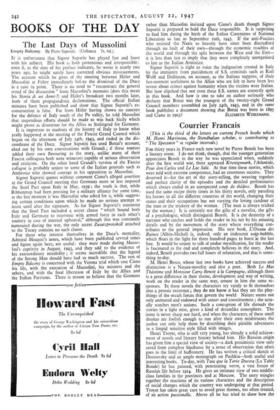BOOKS OF THE DAY
The Last Days of Mussolini
Empty Balcony. By Piero Saporiti. (Gollancz. 7s. 6d.).
IT is unfortunate that Signor Saporiti has played fast and loose with his subject. His book 1. both pretentious and irresponsible : even if, as the date of his preface indicates, he wrote it nearly two years ago, he might surely have corrected obvious misstatements. The account which he gives of the meeting between Hitler and Mussolini at Feltre immediately before the dismissal of the Duce is a case in point. There is no need to " reconstruct the general trend of the discussion " from Mussolini's memoirs (does this mean his Storia di un Anno ?) and Hitler's broadcast two months later, both of them propagandistic declamations. The official Italian minutes have been published and show that Signor Saporiti's re- construction is false. Far from Hitler having shown no concern for the defence of Italy south of the Po valley, he told Mussolini that stupendous efforts should be made to win back Sicily which might prove as disastrous for the Allies as Stalingrad for Germany.
It is important to students of the history of Italy to know what really happened at the meeting of the Fascist Grand Council which began on the afternoon of July 24th, 1943, and ended in the dis- comfiture of the Duce. Signor Saporiti has used Bottai's account, eked out by his own conversations with Grandi ; if these sources added their own flavouring to the story, unlike many of their Fascist colleagues both were witnesses capable of serious observation and criticism. On the other hand Grandes version of the Fascist collapse is probably unjust to some of the Italian generals such as Ambrosio who showed courage in his opposition to Mussolini.
Signor Saporiti quotes without comment Ciano's alleged assertion at the Grand Council meeting that Germany more or less imposed the Steel Pact upon Italy in May, 5939 ; the truth is that, while Ribbentrop had been pressing for a military alliance for some time, at the last moment it wasMussolini who asked for it, while suggest- ing certain conditions upon which he made no serious attempt to insist until after the signature. As for Signor Saporiti's statement that the Steel Pact included a, secret clause " which bound both Italy and Germany to intervene with armed force in each other's country in case of internal upheaval," although this was constantly rumoured during the war, the only secret Zusatzprotokoll attached to the Treaty contains no such clause. For those who interest themselves in the Duce's mentality, Admiral Maugeri's notes, which have been published several tunes and figure again here, are useful: they were made during Musso- lini's captivity in August, 1943, and they add to the evidence of his extraordinary instability ; it seems incredible that the legend of the Strong Man should have had so much success. The rest of Empty Balcony is concerned with the Verona trial which cost Ciano his life, with the execution of Mussolini, his mistress and the others, and with the final liberation of Italy by the Allies and the Italian Partisans. There is reason to believe that the Germans
rather than Mussolini insisted upon Ciano's death though Signor Saporiti is prepared to hold the Duce responsible. It is surprising to find him dating the birth of the Italian Committee of National Liberation so late as September loth, 1943. If the anti-Fascists who resisted the Nazis so bravely have since been discredited thiough no fault of their own—through the economic troubles of the world and through the split between the West and the East— it is less than just to imply that they were completely unorganised so late as the Italian Armistice.
Signor Saporiti is right to voice the indignation created in Italy by the immunity from punishment of S.S. criminals such as Karl Wolff and Dollmann, on account, as the Italians suppose, of their last-moment usefulness to the Allies who are felt to have been less severe about crimes against humanity when the victims were Italian. But how slipshod that not even these S.S. names are correctly spelt in this book. And how is one to take an author seriously who declares that Bottai was the youngest of the twenty-eight Grand Council members assembled on July 24th, 1943, and in the same book publishes a document showing that Bottai was born in 1895


































 Previous page
Previous page